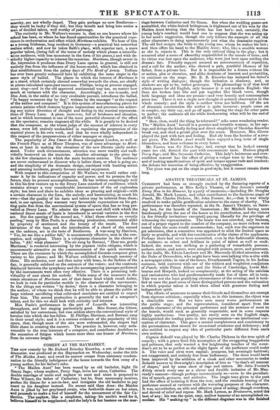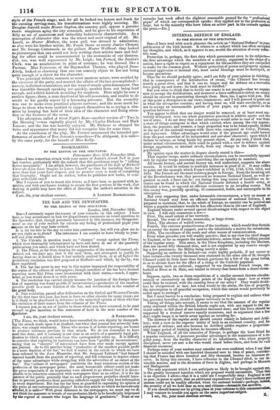AMATEUR THEATRICALS AT ST. JAMES'S.
Cumosrrr had been so strongly excited by the flattering reports of a private performance, at Miss Kelly's Theatre, of Ben Jonson's comedy Every Man in his Humour, by a party of amateurs,—including Mr. Douglas Jerrold, Mr. Mark Lemon, and other contributors to the facetious pages of Punch, Mr. Charles Dickens, Mr. John Forster, &c.,—that it was wisely resolved to make public gratification minister to the cause of charity. The performance was therefore repeated, at the St. James's Theatre, on Satur- day last, for the benefit of the Sanatorium ; Mr Mitchell having most handsomely given the use of the house as his contribution, and the visiters (a few friendly invitations excepted) paying liberally for the privilege of witnessing the representation. The house was not crowded, only because, out of a proper regard to the comfort of the company, no more tickets were issued than the seats would accommodate; but, such was the eagerness to get admission, that a committee was appointed to allot the limited space as fairly as possible, and with due consideration of the claims of the applicants. Perhaps there had newer been assembled, even in this fashionable theatre, an audience so select and brilliant in point of talent as well as rank. Indeed, the scene was striking as a gathering of remarkable persons: authors, artists, and actors, were mingled with princes, peers, and peeresses. In the stalls, Mr. Edwin Landseer and Mr. Macready divided attention with the Duke of Devonshire, who might have been seen talking tine-a-tete with a newspaper critic; in one of the boxes, Dwarkanauth Tagore, in his Indian costume, held converse with one of the wittiest and weightiest coadjutors of Punch; while Prince Albert and the Duke of Cambridge, Lords Mel- bourne and Morpeth, looked on complacently, at the acting of the satirists and caricaturists who had goodhuniouredly made fun of them all in turn. This was not the least gratifying circumstance of the evening; and it testi- fied at once the good sense of these distinguished persons and the estimation in which popular talent is held when allied with generous feeling and independent spirit.
The efforts of amateurs to amuse their friends and themselves are exempt from rigorous criticism; especially when, as in this instance, the object was a charitable one. But we have seen many worse performances on the public stage; and the representation, considered apart from the notable character of the principal performers and the newness of most to the boards, would rank as generally respectable, and in some respects highly meritorious. One quality, too rarely seen on the English stage, distinguished the leading parts in this representation—an intellectual con- ception of character. This gave a mental completeness and consistency to the personations, that atoned for occasional crudeness and deficiency; and also entitled to respect any idea of particular parts different from one's own notions.
Captain Babadil was played by Mr. Charles Dickens in the true spirit of comedy; with a grave bona fide assumption of the swaggering braggadocio and poltroon, that only wanted a few heightening touches of the come- dian's art to be as perfect as the slight figure of the performer could make it. The voice and strut were capital; pompous, but seemingly habitual; not exaggerated, and entirely free from buffoonery. The dress would have been improved by the addition of a cloak and other accessories to make Bobadil answer to Downright's description of him as "be that's all manner of shapes," and by some show of rags and tatters. Mr. John Forster's illely struck every one as a clever and forcible imitation of Mr. Mac- ready's manner—though perhaps unconsciously so—even to the peculiari- ties of speech, gestures, and attitudes. The tragic tone given to the part had the effect of isolating it from the rest; and the resolute bearing of the performer seemed at variance with the wavering purposes ot the character. It was, nevertheless, an able and effective piece of acting; though overdone, and devoid of relief and repose. Mr. Mark Lemon, as Brainwortn, acted the best of any: his was the quiet, easy, mellow humour of an accomplished co- median. His " making-up " in the different disguises was in the finished
style of the French stage; and, for all he looked too honest and frank for the cunning serving-man, his transformations were highly amusing. Mr. Douglas Jerrold made Master Stephen, the country gull, appear a genuine rustic simpleton aping the city coxcomb, and he gave to his expression of folly an air of quaintness and imbecility ludicrously characteristic. As a conception of character this was the truest and most original of all. Mr. Leech, as Master Mathew, the town gull, was dressed to admiration; as also were his brother artists, Mr. Frank Stone as merry Justice Clement, and Mr. George Cattermole as the gallant Master Wellbred they looked SO picturesque that one could not help wishing their artistic taste and feel- ing for effect could be communicated to the costumists of our theatres. Cob, too, was well represented by Mr. Leigh; but Formal, the Justice's Clerk, was an anachronism in point of costume; he was dressed like a Puritan. Miss Fortescue, of the Haymarket Theatre, who played Dame iitely, looked so charming that one can scarcely object to her not being quite enough of a shrew for the character.
Two principal defects, common to most amateur actors, were avoided by the cleverest of the party, and marred the efforts of the less accomplished— namely, indistinct enunciation, and the want of steady quiet demeanour. One was inaudible through speaking too quickly, another from not being loud enough, and a third mistook mouthing for emphasis. Here might be seen a restless figure; there, a man deprived of his self-possession, and unable to do credit to his goodly aspect by a becoming presence. But the assembly was one to make even practised players nervous; and the more merit be- longs to those who were enabled to support themselves in so trying a situ- ation by keeping fast hold of their idea of the character and fixing atten- tion on the business of the scene.
The afterpiece, called A Good Night's Rest—another version of" Two in the Morning "—was capitally played by Mr. Charles Dickens and Mark Lemon ; and the fun was heartily enjoyed. Mr. Dickens so changed his voice and appearance that many did not recognize him for some time.
At the conclusion of the play, Mr. Forster announced the intended per- formance of another of Ben Jonson's comedies—The Alchymist, it is said— by the same party, for the benefit of Miss Kelly.



























 Previous page
Previous page